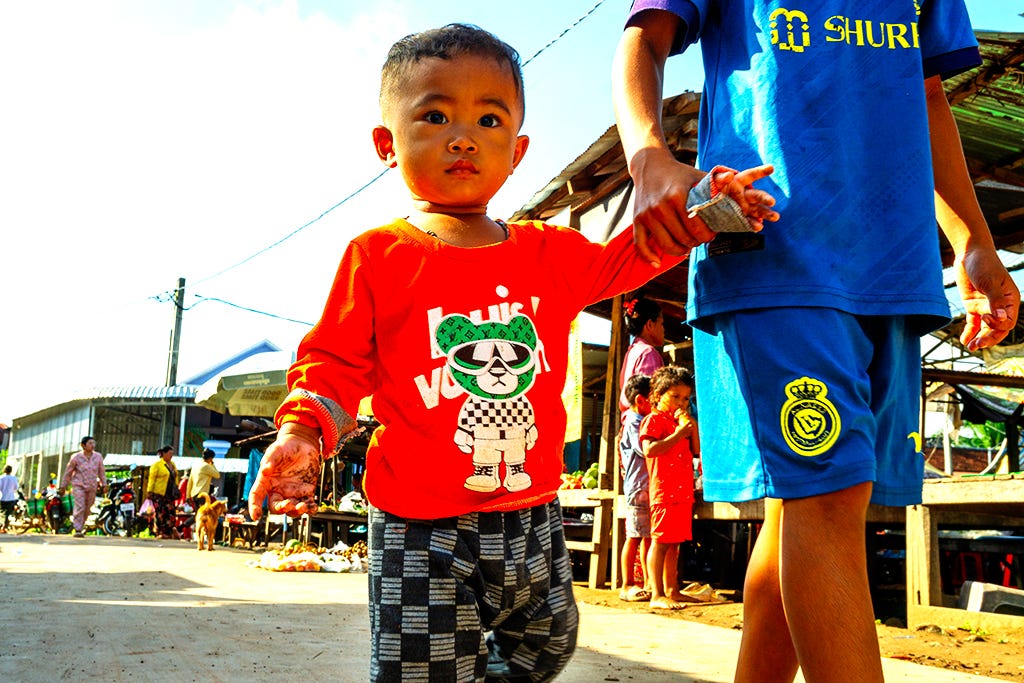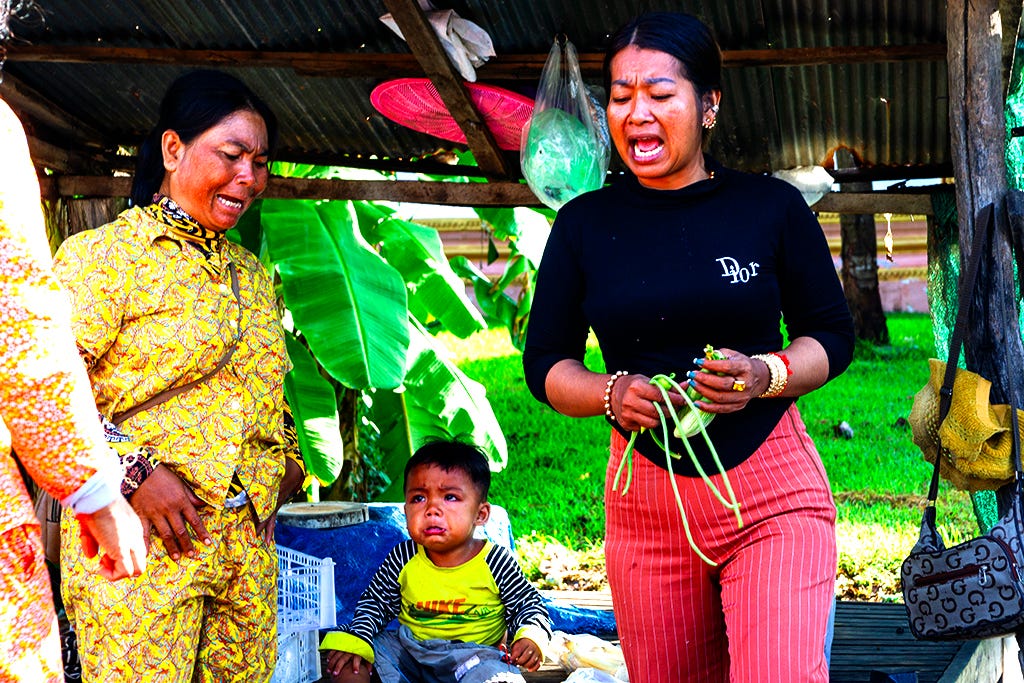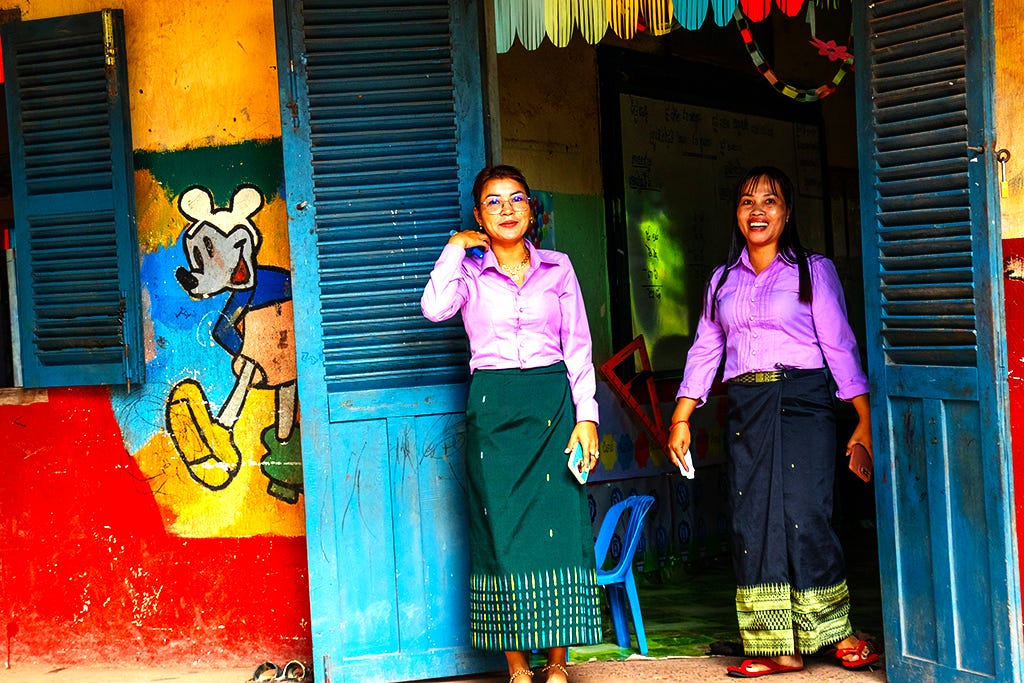[Kracheh, Cambodia on 10/21/23]
There’s always another layer to peel, of course. Your faithful and devoted wife of 85 years may turn out to be a transsexual therian with a dozen kids and 30-odd grandchildren you’ve never met. Finally outed, he, she, they or it speaks in a voice that comes from some distant galaxy, deepest layer of the earth or many thousand years from an inhuman past or future. “But I still love you,” it tearfully whimpers.
It turns out the owner of Phum Cafe speaks some Vietnamese, for he spent four years working in Tân Tiến, a village I had never heard of. Bordering Cambodia and away from everything, its name means “Progress,” or, most literally, “Towards Modernity.” Just as many guys named Giàu or Rich are dirt poor, I’m certain Tân Tiến is only inching towards the 12th or 13th century.
In Kracheh, I’ve gained a better understanding of how people get by. In front of Cafe Tokea, a married couple pay its owner 30,000 riels [$6.50] each day to display their pots, pans, knives, scissors, plates, bowls and wash basins, etc. It’s enough stock for a tiny store. Setting up at dawn, they’re usually gone by 1PM. On a good day, they may make $20 in profit. It’s not easy.
Helping them to unload and load, a motorbike taxi man, Cu, is tipped 3,000 riels, and he also makes 5,000 from the cafe owner, so that’s $2. Whenever I hire Cu, I pay him double, so $5 usually. For a slightly longer trip yesterday to Kolab, a tiny village with no information in English online, I paid him $6.25, plus lunch, which came to $3.50 for both of us. Born here, Cu is a great guide.
Cu’s wife rides a beat up bike around to collect recyclables, and his 35-year-old son, a furniture maker, has been unemployed for months. His daughter-in-law is pregnant. His other son is only 14, so in school. To make their situation even direr, Cu has an undiagnosed eye condition which forces him to wear shades all day long. Doctors here are so bad, any treatment is likely to make it worse. In Cambodia, Laos and Vietnam, the poor rely on pharmacists for medical advices.
By the Mekong two days ago, I talked with a man much better situated. An English teacher at an Arizon school 30 miles away, he makes $500 a month. His wife stays home to take care of their one-year-old son. A few months ago, he bought a used Lexus from a friend for $10,000, payable over five years. His house, he owns outright. Hearing I had lived in the US, his eyes lit up, “I want to go there. Everybody wants to go there.”
“OK, so go there!”
“I don’t have the opportunity.”
“Man, you’re making enough here! In the US, your wife will have to work, and your kid will be in a preschool. That’s terrible. Kids that small should be at home. Strangers are not going to take good care of your kid, man. I should know. My mother worked in a preschool! I wouldn’t want her to take care of my kids!”
From his height, heft, teeth and posture, I could tell he didn’t grow up poor, and though his English was still shaky, he had had the means and time to study it, enough to become a teacher. The name of his school is derived from an American city, he explained.
“No, it’s a state,” I corrected him. “Arizona!”
Always the village explainer, I told him to go on YouTube, “Search for homeless, plus any American city. Philadelphia, San Francisco, Los Angeles, Seattle, Chicago or Denver. You’ll see!”
Then, “In the US, even old people are living outside. The rent is too high! And it’s cold there, man, not like here. People freeze to death,” I clutch myself. To die from the cold is inconceivable here. “If you buy a house, it takes 30 years to pay it off, so it’s like you’re paying rent every month. If you don’t have a house, you can go to relative. If I go to my brother in the US, I won’t be able to stay for long. Maybe a week, or a month at most. Even if he’s OK with it, his wife won’t be, you understand?”
I can’t remember if I explained to him about property taxes, so even Americans who have managed to pay off the banks, after decades, can still end up on the streets. Very skeptically, this young man grinned at me. Whatever. At least he knows Arizona is a state. Of paradise, he’ll dream.
Should he end up in Tucson or Phoenix some day, he won’t be able to find work as a dishwasher even. Like anyone else, I’d hire a much sturdier Mexican or Honduran.
With minimal English, the receptionist at Heng Heng makes $275 a month, plus free food. It’s an exceedingly easy job, but he only gets two days off monthly. Nearly all day, he lies on a cot. Back in the village, his wife doesn’t work. They have three kids.
With his Jesus’ Mobile, he has a side racket taking tourists to see the fresh water dolphins, but there are very few visitors from the US, Europe, Australia, Japan or South Korea these days. “They’re running out of money, too,” I told him.
On the west side of Kracheh’s main market, there’s a young lady with a very thoughtful, intelligent face, and I didn’t come to this conclusion just because she wore glasses. On her bicycle, she sells just two types of vegetables. Had she been born into another place or time, she might have become a teacher or poet. How many like her are being murdered, right this minute? Faced with such injustice, we imagine many more lives for each of us.
Cu’s real name is Triệu, meaning “million.” It’s derived from the Chinese 兆. Since Cu is a goofy nickname for kids meaning “Penis,” I always call him anh [brother], ông [mister] or xếp [boss]. The last is derived from the French chef.
“Where will you go after this?” he asked me.
“Maybe Vietnam, or back to Laos.”
“I will stay here, and I’ll die here,” he chuckled.
“When you’re young, you think I’ll see this or that place again, and I’ve revisited a few places, but at this point, who knows? We can die at any time.”
For “we,” I used “mình,” which can mean body, we, us, I or even one’s spouse. Similarly, most Orientals use “same womb” to mean those belonging to the same nation. It’s derived from the Chinese 同胞. Vietnamese, đồng bào, then, have come from the same womb, as have Koreans, Japanese and, of course, Chinese. Though without scientific basis, it’s a powerful concept, and very poetic. It’s more intimate than compatriots, which means those with the same fatherland.
Halfway through this article, two kids under seven wandered into Phum Cafe. Allowed by their mom to buy snacks, each picked a small bag of Swing potato chips. Turning around, they looked at me with this look of guilt and consternation, as if such luck and bounty were too much to bear.
Tomorrow, I’ll take another trip with Cu. My time here is winding down. We’ll have a good lunch somewhere. We can die at any time.
[Kracheh, 10/21/23]
[Kolab, Cambodia, 10/23/23]
[Kolab, 10/23/23]
[teachers at elementary school attached to temple in Kolab, 10/23/23]








Dear Linh, your very good piece this week puts me in mind of young men wiith long hair and leathers in my youth telling me confidently that the end of 'the system' was nigh quite shortly. Now, fifty odd years later, if still alive they are much older than you, perhaps still waiting, who knows, frail, grey and old. In that time, some systems, some peoples' worlds have come apart but such things are very hard to predict and not a good prospect to bet on. The eve of destruction does seem closer than ever, I agree. Glad you are better.
Another essay to ease my day. Always love the pictures and the sentiment, too. Hope you continue to heal. Are you better?